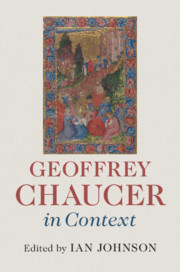Book contents
- Geoffrey Chaucer in Context
- Geoffrey Chaucer in Context
- Copyright page
- Contents
- Illustrations
- Contributors
- Abbreviations
- Introduction
- Part I Chaucer as Context
- Part II Books, Discourse and Traditions
- Chapter 3 Chaucer’s Linguistic Invention
- Chapter 4 Chaucer and London English
- Chapter 5 Manuscripts and Manuscript Culture
- Chapter 6 Chaucer’s Books
- Chapter 7 Authority
- Chapter 8 Literary Theory and Literary Roles
- Chapter 9 Metre and Versification
- Chapter 10 Dialogue
- Chapter 11 Romance
- Chapter 12 Love
- Chapter 13 Chaucer and the Classics
- Chapter 14 The French Context
- Chapter 15 The Italian Tradition
- Chapter 16 The English Context
- Chapter 17 Chaucer’s Competitors
- Chapter 18 Boethius
- Part III Humans, the World and Beyond
- Part IV Culture, Learning and Disciplines
- Part V Political and Social Contexts
- Part VI Chaucer Traditions
- Further Reading
- Index
Chapter 17 - Chaucer’s Competitors
from Part II - Books, Discourse and Traditions
Published online by Cambridge University Press: 24 June 2019
- Geoffrey Chaucer in Context
- Geoffrey Chaucer in Context
- Copyright page
- Contents
- Illustrations
- Contributors
- Abbreviations
- Introduction
- Part I Chaucer as Context
- Part II Books, Discourse and Traditions
- Chapter 3 Chaucer’s Linguistic Invention
- Chapter 4 Chaucer and London English
- Chapter 5 Manuscripts and Manuscript Culture
- Chapter 6 Chaucer’s Books
- Chapter 7 Authority
- Chapter 8 Literary Theory and Literary Roles
- Chapter 9 Metre and Versification
- Chapter 10 Dialogue
- Chapter 11 Romance
- Chapter 12 Love
- Chapter 13 Chaucer and the Classics
- Chapter 14 The French Context
- Chapter 15 The Italian Tradition
- Chapter 16 The English Context
- Chapter 17 Chaucer’s Competitors
- Chapter 18 Boethius
- Part III Humans, the World and Beyond
- Part IV Culture, Learning and Disciplines
- Part V Political and Social Contexts
- Part VI Chaucer Traditions
- Further Reading
- Index
Summary
Chaucer’s early fame as the founding father of the English literary tradition is still justified on the basis of his linguistic and metrical achievements. However, he was only one of a number of later fourteenth-century writers engaged in making English a fit medium for literature. While Chaucer experimented with bringing complex continental forms of metre and stanza into English, the poets of Sir Gawain and the Green Knight, Pearl, the Morte Arthure, and Piers Plowman were turning the traditional alliterative metre into a vehicle to display poetic virtuosity. Chaucer’s prose works of learning and philosophy also have distinguished competitors. His translations of the Consolation of Philosophy by Boethius and his Treatise on the Astrolabe were made at the same time as huge encyclopaedic and historical works were being translated into English by his contemporary John Trevisa. The work of Chaucer’s competitors, much of it now neglected, offers revealing perspectives on his achievements.
- Type
- Chapter
- Information
- Geoffrey Chaucer in Context , pp. 140 - 146Publisher: Cambridge University PressPrint publication year: 2019

